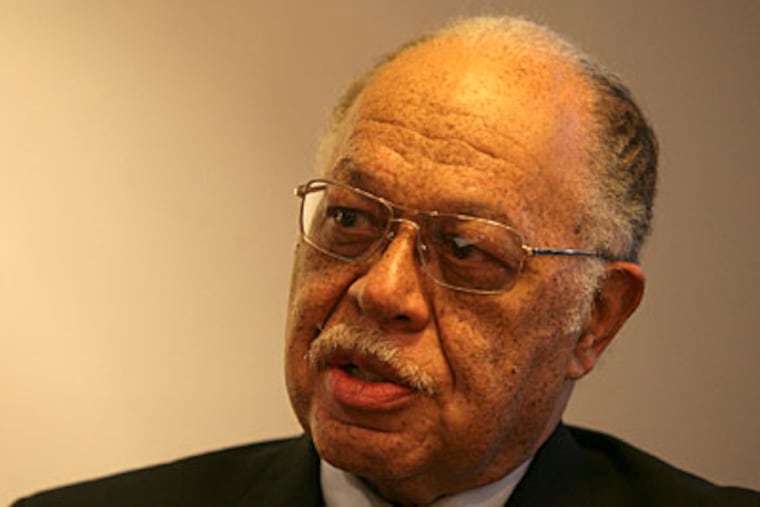Karen Heller: Politics clouded the safeguards against practices like Gosnell's
The abysmal conditions of Kermit Gosnell's abortion clinic strain credulity. A searing grand jury report charges that his filthy facility at 38th and Lancaster butchered babies and women for more than three decades.

The abysmal conditions of Kermit Gosnell's abortion clinic strain credulity. A searing grand jury report charges that his filthy facility at 38th and Lancaster butchered babies and women for more than three decades.
The problems were obvious to any visitor. The facility reeked of cat urine. Blankets and furniture were splattered with blood. One government agent described it as "a bad gas station restroom." Fetal remains were discovered in milk cartons, jars, jugs, and freezers. Everywhere.
Gosnell is charged with killing seven babies and 41-year-old Karnamaya Mongar, a political refugee from Bhutan.
"Over the years, many people came to know that something was going on here," the report states. "But no one put a stop to it."
Pennsylvania's Department of Health knew about Gosnell. The Department of State knew. The city's Health Department knew. Esteemed medical officials, including Dr. Donald Schwarz, then at Children's Hospital of Philadelphia, now the city's health commissioner, stopped referring patients because he knew.
The National Abortion Federation, the association of providers charged with upholding health and legal standards, was cognizant of Gosnell's shoddy clinic. So were reproductive-rights organizations. The Penn health system treated Gosnell's botched patients. Many individuals, including Schwarz, filed complaints but no one did enough to stop Gosnell. The clinic was ultimately busted for illegally prescribing painkillers. Only then were the horrors made public.
Let's take politics out of the equation. Abortion is a legal medical procedure. The very reason advocates champion its legality, along with proper oversight, is to avoid exactly the type of back-alley butchery that Gosnell is now charged with inflicting.
In a country whose medical care is the envy of the world (even if its delivery is not), abortion should be as safe as any other surgery.
People on both sides of the abortion debate should have been outraged by what was happening. Such atrocities should rise above ideology, appealing to basic humanity. Agencies charged with abortion clinics' oversight should have done their job, and acted swiftly on complaints.
Instead, the grand jury asserts, "even nail salons in Pennsylvania are monitored more closely for client safety."
The problem is you can't take politics out of abortion. Politics clouds the whole scenario. And that, I suspect, is where the network of potential safeguards fell apart.
It's precisely because Gosnell was performing abortions that he was held to fewer inspections and less government supervision than salons, kennels, or your car.
Pennsylvania's Department of Health stopped inspecting abortion clinics when Tom Ridge, an advocate of abortion rights, became governor. The restraint continued under Gov. Ed Rendell, who holds the same views.
Despite a litany of complaints and red flags, Gosnell's clinic was not inspected for 17 years. The system made it hard for witnesses - and there were plenty - to testify. Scared, scarred, and often poor, these women had to lodge formal complaints in Harrisburg.
One health official testified that the department ceased inspections so as not to be "putting a barrier up to women" seeking abortions. Another reasoned that "there was a concern that if they did routine inspections, that they may find a lot of these facilities didn't meet" standards. The Health Department's chief counsel defended the inaction, even after Karnamaya Mongar's death, callously saying: "People die."
Government officials, entrusted with protecting the public, did what seemed politically expedient, not what was fundamentally right. Safety was far less important than access and the reigning climate in Harrisburg.
The Jan. 19 release of the grand jury report couldn't have been more explosive, coming one day after conservative Republicans took control of the state capital, and a fortnight after they assumed the majority of the U.S. House of Representatives. They have vowed to repeal national health care and challenge abortion laws.
In the past week, Gosnell's grotesque facility has become a grenade in the nation's scorching abortion battle, cited by foes as an example of current practice rather than as an aberration.
Abortion advocates, including politicians, have offered feeble defenses as to why they weren't more vocal in demanding that government officials shut Gosnell down. They should have led the charge to guarantee all women the finest health care, to uphold current abortion laws, and to pursue practitioners like Gosnell suspected of grossly violating them. They should have acted to save women's lives, to protect their health.
Gosnell sits behind bars without bail. His case is not isolated. His actions should shame people into demanding stricter supervision of abortion clinics.
"We are concerned, however, about the patients whose doctors do not end up in the news," the grand jury asserts, "doctors who may be unethical, reckless, or unprofessional every day with impunity."
We should all be.
Health regulators have ordered 14 of Pennsylvania's 22 abortion clinics to correct problems found during inspections, none remotely as grave as those discovered in West Philadelphia. Gov. Corbett has asked the secretaries of health and state to make recommendations to address oversight. State senators moved swiftly to hold hearings, introducing bills to improve safety standards and create a system that responds expediently to complaints.
It's a start.